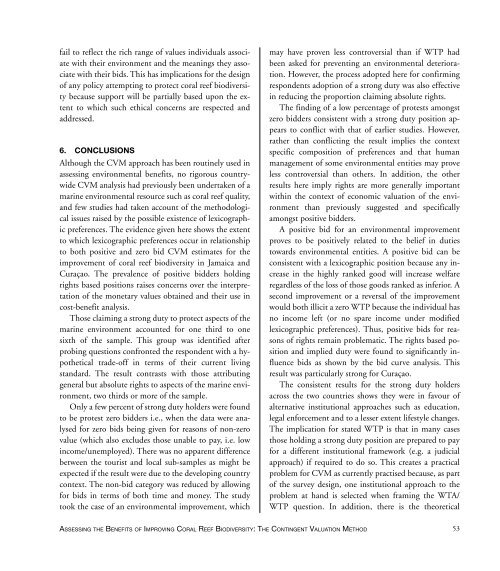You also want an ePaper? Increase the reach of your titles
YUMPU automatically turns print PDFs into web optimized ePapers that Google loves.
fail to reflect the rich range <strong>of</strong> values individuals associate<br />
with their environment and the meanings they associate<br />
with their bids. This has implications for the design<br />
<strong>of</strong> any policy attempting to protect coral reef biodiversity<br />
because support will be partially based upon the extent<br />
to which such ethical concerns are respected and<br />
addressed.<br />
6. CONCLUSIONS<br />
Although the CVM approach has been routinely used in<br />
assessing environmental benefits, no rigorous countrywide<br />
CVM analysis had previously been undertaken <strong>of</strong> a<br />
marine environmental resource such as coral reef quality,<br />
and few studies had taken account <strong>of</strong> the methodological<br />
issues raised by the possible existence <strong>of</strong> lexicographic<br />
preferences. The evidence given here shows the extent<br />
to which lexicographic preferences occur in relationship<br />
to both positive and zero bid CVM estimates for the<br />
improvement <strong>of</strong> coral reef biodiversity in Jamaica and<br />
Curaçao. The prevalence <strong>of</strong> positive bidders holding<br />
rights based positions raises concerns over the interpretation<br />
<strong>of</strong> the monetary values obtained and their use in<br />
cost-benefit analysis.<br />
Those claiming a strong duty to protect aspects <strong>of</strong> the<br />
marine environment accounted for one third to one<br />
sixth <strong>of</strong> the sample. This group was identified after<br />
probing questions confronted the respondent with a hypothetical<br />
trade-<strong>of</strong>f in terms <strong>of</strong> their current living<br />
standard. The result contrasts with those attributing<br />
general but absolute rights to aspects <strong>of</strong> the marine environment,<br />
two thirds or more <strong>of</strong> the sample.<br />
Only a few percent <strong>of</strong> strong duty holders were found<br />
to be protest zero bidders i.e., when the data were analysed<br />
for zero bids being given for reasons <strong>of</strong> non-zero<br />
value (which also excludes those unable to pay, i.e. low<br />
income/unemployed). There was no apparent difference<br />
between the tourist and local sub-samples as might be<br />
expected if the result were due to the developing country<br />
context. The non-bid category was reduced by allowing<br />
for bids in terms <strong>of</strong> both time and money. The study<br />
took the case <strong>of</strong> an environmental improvement, which<br />
may have proven less controversial than if WTP had<br />
been asked for preventing an environmental deterioration.<br />
However, the process adopted here for confirming<br />
respondents adoption <strong>of</strong> a strong duty was also effective<br />
in reducing the proportion claiming absolute rights.<br />
The finding <strong>of</strong> a low percentage <strong>of</strong> protests amongst<br />
zero bidders consistent with a strong duty position appears<br />
to conflict with that <strong>of</strong> earlier studies. However,<br />
rather than conflicting the result implies the context<br />
specific composition <strong>of</strong> preferences and that human<br />
management <strong>of</strong> some environmental entities may prove<br />
less controversial than others. In addition, the other<br />
results here imply rights are more generally important<br />
within the context <strong>of</strong> economic valuation <strong>of</strong> the environment<br />
than previously suggested and specifically<br />
amongst positive bidders.<br />
A positive bid for an environmental improvement<br />
proves to be positively related to the belief in duties<br />
towards environmental entities. A positive bid can be<br />
consistent with a lexicographic position because any increase<br />
in the highly ranked good will increase welfare<br />
regardless <strong>of</strong> the loss <strong>of</strong> those goods ranked as inferior. A<br />
second improvement or a reversal <strong>of</strong> the improvement<br />
would both illicit a zero WTP because the individual has<br />
no income left (or no spare income under modified<br />
lexicographic preferences). Thus, positive bids for reasons<br />
<strong>of</strong> rights remain problematic. The rights based position<br />
and implied duty were found to significantly influence<br />
bids as shown by the bid curve analysis. This<br />
result was particularly strong for Curaçao.<br />
The consistent results for the strong duty holders<br />
across the two countries shows they were in favour <strong>of</strong><br />
alternative institutional approaches such as education,<br />
legal enforcement and to a lesser extent lifestyle changes.<br />
The implication for stated WTP is that in many cases<br />
those holding a strong duty position are prepared to pay<br />
for a different institutional framework (e.g. a judicial<br />
approach) if required to do so. This creates a practical<br />
problem for CVM as currently practised because, as part<br />
<strong>of</strong> the survey design, one institutional approach to the<br />
problem at hand is selected when framing the WTA/<br />
WTP question. In addition, there is the theoretical<br />
ASSESSING THE BENEFITS OF IMPROVING CORAL REEF BIODIVERSITY: THE CONTINGENT VALUATION METHOD<br />
53


















